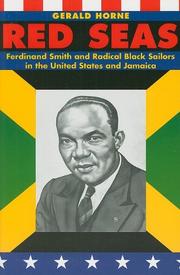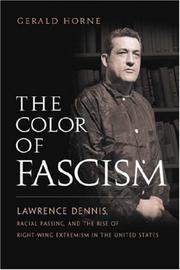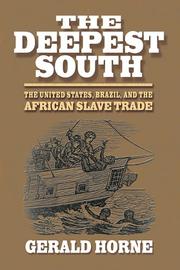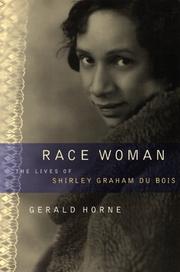| Listing 1 - 10 of 55 | << page >> |
Sort by
|

ISBN: 0814737404 0814736688 0814773346 1429414170 0814744540 9781429414173 9780814736685 9780814773345 9780814744543 Year: 2005 Publisher: New York New York University Press
Abstract | Keywords | Export | Availability | Bookmark
 Loading...
Loading...Choose an application
- Reference Manager
- EndNote
- RefWorks (Direct export to RefWorks)
During the heyday of the U.S. and international labor movements in the 1930's and 1940's, Ferdinand Smith, the Jamaican-born co-founder and second-in-command of the National Maritime Union (NMU), stands out as one of the most-if not the most-powerful black labor leaders in the United States. Smith's active membership in the Communist Party, however, coupled with his bold labor radicalism and shaky immigration status, brought him under continual surveillance by U.S. authorities, especially during the Red Scare in the 1950's. Smith was eventually deported to his homeland of Jamaica, where he
African American communists -- Biography. --- Jamaican Americans -- Biography. --- Labor leaders -- Jamaica -- Biography. --- Labor leaders -- United States -- Biography. --- National Maritime Union of America -- History -- 20th century. --- Smith, Ferdinand. --- Labor leaders --- African American communists --- Jamaican Americans --- Labor & Workers' Economics --- Business & Economics --- National Maritime Union of America --- History --- Afro-American communists --- Communists, African American --- Communists, Negro --- Labor movement leaders --- Leaders, Labor --- Smith, Ferdinand C., --- National Maritime Union (U.S.) --- NMU --- Ethnology --- Jamaicans --- Communists --- Social reformers --- Scandinavian Seamen's Club --- 20th. --- Afro-Caribbean. --- Communist. --- Ferdinand. --- Smith. --- activism. --- biography. --- black. --- century. --- dimensions. --- first. --- labor. --- leader. --- left. --- light. --- political. --- race. --- radicalism. --- shed. --- which.

ISBN: 9786612358579 052093993X 128235857X 1601295014 9780520939936 1429408219 9781429408219 9781601295019 9781282358577 0520243722 0520248600 9780520243729 9780520248601 Year: 2006 Publisher: Berkeley
Abstract | Keywords | Export | Availability | Bookmark
 Loading...
Loading...Choose an application
- Reference Manager
- EndNote
- RefWorks (Direct export to RefWorks)
Before he attained notoriety as Dean of the Hollywood Ten-the blacklisted screenwriters and directors persecuted because of their varying ties to the Communist Party-John Howard Lawson had become one of the most brilliant, successful, and intellectual screenwriters on the Hollywood scene in the 1930's and 1940's, with several hits to his credit including Blockade, Sahara, and Action in the North Atlantic. After his infamous, almost violent, 1947 hearing before the House Un-American Activities Committee, Lawson spent time in prison and his lucrative career was effectively over. Studded with anecdotes and based on previously untapped archives, this first biography of Lawson brings alive his era and features many of his prominent friends and associates, including John Dos Passos, Theodore Dreiser, F. Scott Fitzgerald, Charles Chaplin, Gene Kelly, Edmund Wilson, Ernest Hemingway, Humphrey Bogart, Dalton Trumbo, Ring Lardner, Jr., and many others. Lawson's life becomes a prism through which we gain a clearer perspective on the evolution and machinations of McCarthyism and anti-Semitism in the United States, on the influence of the left on Hollywood, and on a fascinating man whose radicalism served as a foil for launching the political careers of two Presidents: Richard Nixon and Ronald Reagan. In vivid, marvelously detailed prose, Final Victim of the Blacklist restores this major figure to his rightful place in history as it recounts one of the most captivating episodes in twentieth century cinema and politics.
Motion picture industry --- Theater --- Communism and literature --- Blacklisting of authors --- Screenwriters --- Dramatists, American --- History. --- History --- Lawson, John Howard, --- Lawson, J. H. --- Lewis, Edward, --- Lao-hsün, --- Lawson, John Howard, -- 1894-1977.. --- Dramatists, American -- 20th century -- Biography.. --- Screenwriters -- United States -- Biography.. --- Blacklisting of authors -- United States.. --- Communism and literature -- United States -- History -- 20th century.. --- Theater -- New York (State) -- New York -- History -- 20th century.. --- Motion picture industry -- California -- Los Angeles -- History. --- 1930s. --- 1940s. --- 1947. --- 20th century. --- america. --- antisemitism. --- biographical. --- blacklist. --- california. --- cinema. --- communism. --- communist party. --- directors. --- edmund wilson. --- ernest hemingway. --- f scott fitzgerald. --- gene kelly. --- historical nonfiction. --- hollywood ten. --- hollywood. --- house unamerican activities committee. --- imprisonment. --- infamy. --- john dos passos. --- john howard lawson. --- joseph mccarthy. --- mccarthyism. --- political figures. --- politics. --- radical politics. --- red scare. --- screenwriters. --- united states. --- us history.

ISBN: 0814773311 0814744516 1435600339 9781435600331 0814736866 9780814736869 9780814744512 0814737331 Year: 2006 Publisher: New York New York University Press
Abstract | Keywords | Export | Availability | Bookmark
 Loading...
Loading...Choose an application
- Reference Manager
- EndNote
- RefWorks (Direct export to RefWorks)
What does it mean that Lawrence Dennis-arguably the "brains" behind U.S. fascism-was born black but spent his entire adult life passing for white? Born in Atlanta in 1893, Dennis began life as a highly touted African American child preacher, touring nationally and arousing audiences with his dark-skinned mother as his escort. However, at some point between leaving prep school and entering Harvard University, he chose to abandon his family and his former life as an African American in order to pass for white. Dennis went on to work for the State Department and on Wall Street, and ultimately bec
Isolationism --- Radicalism --- Passing (Identity) --- African Americans --- Right-wing extremists --- Fascists --- International relations --- Neutrality --- Extremism, Political --- Ideological extremism --- Political extremism --- Political science --- Identity (Psychology) --- Far-right extremists --- Radicals --- Dennis, Lawrence,

ISBN: 0814790739 0814737285 9780814737286 9780814736883 0814736882 9780814736890 0814736890 9780814790731 Year: 2007 Publisher: New York : New York University Press,
Abstract | Keywords | Export | Availability | Bookmark
 Loading...
Loading...Choose an application
- Reference Manager
- EndNote
- RefWorks (Direct export to RefWorks)
During its heyday in the nineteenth century, the African slave trade was fueled by the close relationship of the United States and Brazil. The Deepest South tells the disturbing story of how U.S. nationals - before and after Emancipation -- continued to actively participate in this odious commerce by creating diplomatic, social, and political ties with Brazil, which today has the largest population of African origin outside of Africa itself. Proslavery Americans began to accelerate their presence in Brazil in the 1830's, creating alliances there-sometimes friendly, often contentious-with Portug
Slavery --- Slave-trade --- History --- Slave trade --- Based. --- Gerald. --- Horne. --- archives. --- breaks. --- continents. --- defenders. --- degrees. --- dimensions. --- extensive. --- five. --- from. --- global. --- ground. --- history. --- maintain. --- research. --- slavery. --- startling. --- uncovering. --- went. --- which.
Book
ISBN: 081479050X 9780814790502 9780814744635 081474463X 9780814773499 0814773494 1479876399 Year: 2012 Publisher: New York, NY
Abstract | Keywords | Export | Availability | Bookmark
 Loading...
Loading...Choose an application
- Reference Manager
- EndNote
- RefWorks (Direct export to RefWorks)
While it is well known that more Africans fought on behalf of the British than with the successful patriots of the American Revolution, Gerald Horne reveals in his latest work of historical recovery that after 1776, Africans and African-Americans continued to collaborate with Great Britain against the United States in battles big and small until the Civil War. Many African Americans viewed Britain, an early advocate of abolitionism and emancipator of its own slaves, as a powerful ally in their resistance to slavery in the Americas. This allegiance was far-reaching, from the Caribbean to outposts in North America to Canada. In turn, the British welcomed and actively recruited both fugitive and free African Americans, arming them and employing them in military engagements throughout the Atlantic World, as the British sought to maintain a foothold in the Americas following the Revolution. In this path-breaking book, Horne rewrites the history of slave resistance by placing it for the first time in the context of military and diplomatic wrangling between Britain and the United States. Painstakingly researched and full of revelations, Negro Comrades of the Crown is among the first book-length studies to highlight the Atlantic origins of the Civil War, and the active role played by African Americans within these external factors that led to it. Listen to a one hour special with Dr. Gerald Horne on the "Sojourner Truth" radio show.
Slavery --- Government, Resistance to --- African Americans --- Slave insurrections --- Civil resistance --- Non-resistance to government --- Resistance to government --- Political science --- Political violence --- Insurgency --- Nonviolence --- Revolutions --- Afro-Americans --- Black Americans --- Colored people (United States) --- Negroes --- Africans --- Ethnology --- Blacks --- Slave rebellions --- Slave revolts --- History --- Relations with British --- Insurrections, etc. --- Great Britain --- United States --- Relations --- Black people --- Political resistance

ISBN: 0814744575 058543462X 9780585434629 0814736157 9780814736159 9780814736487 9780814744574 0814736483 Year: 2000 Publisher: New York, N.Y. New York University Press
Abstract | Keywords | Export | Availability | Bookmark
 Loading...
Loading...Choose an application
- Reference Manager
- EndNote
- RefWorks (Direct export to RefWorks)
One of the most intriguing activists and artists of the twentieth century, Shirley Graham Du Bois also remains one of the least studied and understood. In Race Woman , Gerald Horne draws a revealing portrait of this controversial figure who championed the civil rights movement in America, the liberation struggles in Africa and the socialist struggles in Maoist China. Through careful analysis and use of personal correspondence, interviews, and previously unexamined documents, Horne explores her work as a Harlem Renaissance playwright, biographer, composer, teacher, novelist, Left political acti
African American authors --- African Americans --- African American women political activists --- African American women --- Afro-American women political activists --- Women political activists, African American --- Women political activists --- Intellectual life --- Politics and government --- Du Bois, W. E. B. --- Du Bois, Shirley Graham, --- Bois, Shirley Graham Du, --- DuBois, Shirley Graham, --- Grāhaṃ, Ṣerli, --- Graham, Shirley, --- McCanns, Shirley Graham, --- Du Bois, W. E. Burghardt --- Du Bois, W. E. --- Di︠u︡bua, Uilʹi︠a︡m Ėdvard Burgkhardt, --- Di︠u︡bua, Vilʹi︠a︡m, --- Du Bois, William Edward Burghardt, --- DuBois, W. E. B. --- Du Bois, William, --- Du Bois, W. B. --- Bois, du, Shirley Graham --- The. --- available. --- biography. --- dynamic. --- first. --- influential. --- paperback. --- woman151now.
Book
ISBN: 1583675655 9781583675656 9781583675625 1583675620 9781583675632 1583675639 Year: 2015 Publisher: New York
Abstract | Keywords | Export | Availability | Bookmark
 Loading...
Loading...Choose an application
- Reference Manager
- EndNote
- RefWorks (Direct export to RefWorks)
Blacks --- Jacobins --- African Americans --- Slavery --- Afro-Americans --- Black Americans --- Colored people (United States) --- Negroes --- Africans --- Ethnology --- Politics and government. --- History. --- Relations with Haitians --- History --- Political aspects --- United States --- Haiti --- Dominican Republic --- Hispaniola --- ABŞ --- ABSh --- Ameerika Ühendriigid --- America (Republic) --- Amerika Birlăshmish Shtatlary --- Amerika Birlăşmi Ştatları --- Amerika Birlăşmiş Ştatları --- Amerika ka Kelenyalen Jamanaw --- Amerika Qūrama Shtattary --- Amerika Qŭshma Shtatlari --- Amerika Qushma Shtattary --- Amerika (Republic) --- Amerikai Egyesült Államok --- Amerikanʹ Veĭtʹsėndi︠a︡vks Shtattnė --- Amerikări Pĕrleshu̇llĕ Shtatsem --- Amerikas Forenede Stater --- Amerikayi Miatsʻyal Nahangner --- Ameriketako Estatu Batuak --- Amirika Carékat --- AQSh --- Ar. ha-B. --- Arhab --- Artsot ha-Berit --- Artzois Ha'bris --- Bí-kok --- Ē.P.A. --- EE.UU. --- Egyesült Államok --- ĒPA --- Estados Unidos --- Estados Unidos da América do Norte --- Estados Unidos de América --- Estaos Xuníos --- Estaos Xuníos d'América --- Estatos Unitos --- Estatos Unitos d'America --- Estats Units d'Amèrica --- Ètats-Unis d'Amèrica --- États-Unis d'Amérique --- Fareyniḳṭe Shṭaṭn --- Feriene Steaten --- Feriene Steaten fan Amearika --- Forente stater --- FS --- Hēnomenai Politeiai Amerikēs --- Hēnōmenes Politeies tēs Amerikēs --- Hiwsisayin Amerikayi Miatsʻeal Tērutʻiwnkʻ --- Istadus Unidus --- Jungtinės Amerikos valstybės --- Mei guo --- Mei-kuo --- Meiguo --- Mî-koet --- Miatsʻyal Nahangner --- Miguk --- Na Stàitean Aonaichte --- NSA --- S.U.A. --- SAD --- Saharat ʻAmērikā --- SASht --- Severo-Amerikanskie Shtaty --- Severo-Amerikanskie Soedinennye Shtaty --- Si︠e︡vero-Amerikanskīe Soedinennye Shtaty --- Sjedinjene Američke Države --- Soedinennye Shtaty Ameriki --- Soedinennye Shtaty Severnoĭ Ameriki --- Soedinennye Shtaty Si︠e︡vernoĭ Ameriki --- Spojené staty americké --- SShA --- Stadoù-Unanet Amerika --- Stáit Aontaithe Mheiriceá --- Stany Zjednoczone --- Stati Uniti --- Stati Uniti d'America --- Stâts Unîts --- Stâts Unîts di Americhe --- Steatyn Unnaneysit --- Steatyn Unnaneysit America --- SUA (Stati Uniti d'America) --- Sŭedineni amerikanski shtati --- Sŭedinenite shtati --- Tetã peteĩ reko Amérikagua --- U.S. --- U.S.A. --- United States of America --- Unol Daleithiau --- Unol Daleithiau America --- Unuiĝintaj Ŝtatoj de Ameriko --- US --- USA --- Usono --- Vaeinigte Staatn --- Vaeinigte Staatn vo Amerika --- Vereinigte Staaten --- Vereinigte Staaten von Amerika --- Verenigde State van Amerika --- Verenigde Staten --- VS --- VSA --- Wááshindoon Bikéyah Ałhidadiidzooígíí --- Wilāyāt al-Muttaḥidah --- Wilāyāt al-Muttaḥidah al-Amirīkīyah --- Wilāyāt al-Muttaḥidah al-Amrīkīyah --- Yhdysvallat --- Yunaeted Stet --- Yunaeted Stet blong Amerika --- ZDA --- Združene države Amerike --- Zʹi︠e︡dnani Derz︠h︡avy Ameryky --- Zjadnośone staty Ameriki --- Zluchanyi︠a︡ Shtaty Ameryki --- Zlucheni Derz︠h︡avy --- ZSA --- Η.Π.Α. --- Ηνωμένες Πολιτείες της Αμερικής --- Америка (Republic) --- Американь Вейтьсэндявкс Штаттнэ --- Америкӑри Пӗрлешӳллӗ Штатсем --- САЩ --- Съединените щати --- Злучаныя Штаты Амерыкі --- ولايات المتحدة --- ولايات المتّحدة الأمريكيّة --- ولايات المتحدة الامريكية --- 미국 --- Dominika Kyōwakoku --- Dominikaaninen tasavalta --- Dominikanische Republik --- Dominikanska republiken --- Quisqueya --- República Dominicana --- Republiḳah ha-Dominiḳanit --- République dominicaine --- San Domingo --- רפובליקה הדומיניקנית --- ドミニカ共和国 --- Santo Domingo (Spanish colony) --- Ayiti --- Bohio --- Haichi --- Hayti --- Haytian Republic --- Repiblik Ayiti --- Repiblik d Ayiti --- Republic of Haiti --- République d'Haïti --- ハイチ --- هايتي --- Гаити --- Gaiti --- Saint-Domingue --- Española --- Haiti (Island) --- La Española --- Santo Domingo Island --- Antilles, Greater --- Relations --- Influence. --- Territorial expansion --- Spojené obce severoamerické --- Black people --- Black persons --- États-Unis --- É.-U. --- ÉU
Book
ISBN: 1583674578 1583674586 9781583674581 9781583674451 1583674454 9781583674468 1583674462 Year: 2014 Publisher: New York
Abstract | Keywords | Export | Availability | Bookmark
 Loading...
Loading...Choose an application
- Reference Manager
- EndNote
- RefWorks (Direct export to RefWorks)
"The histories of Cuba and the United States are tightly intertwined and have been for at least two centuries. In Race to Revolution, historian Gerald Horne examines a critical relationship between the two countries by tracing out the typically overlooked interconnections among slavery, Jim Crow, and revolution. Slavery was central to the economic and political trajectories of Cuba and the United States, both in terms of each nation's internal political and economic development and in the interactions between the small Caribbean island and the Colossus of the North. Horne draws a direct link between the Black experiences in two very different countries and follows that connection through changing periods of resistance and revolutionary upheaval. Black Cubans were crucial to Cuba's initial independence, and the relative freedom they achieved helped bring down Jim Crow in the United States, reinforcing radical politics within the Black communities of both nations. This in turn helped to create the conditions that gave rise to the Cuban Revolution which, on New Years' Day in 1959, shook the United States to its core. Based on extensive research in Havana, Madrid, London, and throughout the U.S., Race to Revolution delves deep into the historical record, bringing to life the experiences of slaves and slave traders, abolitionists and sailors, politicians and poor farmers. It illuminates the complex web of interaction and influence that shaped the lives of many generations as they struggled over questions of race, property, and political power in both Cuba and the United States"--
Slavery --- African Americans --- Blacks --- Negroes --- Ethnology --- Afro-Americans --- Black Americans --- Colored people (United States) --- Africans --- Abolition of slavery --- Antislavery --- Enslavement --- Mui tsai --- Ownership of slaves --- Servitude --- Slave keeping --- Slave system --- Slaveholding --- Thralldom --- Crimes against humanity --- Serfdom --- Slaveholders --- Slaves --- History. --- Segregation --- Politics and government. --- United States --- Cuba --- Relations --- Race relations. --- Race question --- Black persons --- Black people --- Enslaved persons
Book
ISBN: 1479874973 9781479874972 1479893404 9781479893409 9781479893409 1479893404 9781479806898 1479806897 Year: 2014 Publisher: NYU Press
Abstract | Keywords | Export | Availability | Bookmark
 Loading...
Loading...Choose an application
- Reference Manager
- EndNote
- RefWorks (Direct export to RefWorks)
The successful 1776 revolt against British rule in North America has been hailed almost universally as a great step forward for humanity. But the Africans then residing in the colonies overwhelmingly sided with London. In this trailblazing book, Gerald Horne complements his earlier celebrated Negro Comrades of the Crown, by showing that in the prelude to 1776, the abolition of slavery seemed all but inevitable in London, delighting Africans as much as it outraged slaveholders, and sparking the colonial revolt. In the prelude to 1776, more and more Africans were joining the British military, and anti-slavery sentiments were deepening throughout Britain. And in the Caribbean, rebellious Africans were chasing Europeans to the mainland. Unlike their counterparts in London, the European colonists overwhelmingly associated enslaved Africans with subversion and hostility to the status quo. For European colonists, the major threat to security in North America was a foreign invasion combined with an insurrection of the enslaved. And as 1776 approached, London-imposed abolition throughout the colonies was a very real and threatening possibility - a possibility the founding fathers feared could bring the slave rebellions of Jamaica and Antigua to the thirteen colonies. To forestall it, they went to war. The so-called Revolutionary War, Horne writes, was in large part a counter-revolution, a conservative movement that the founding fathers fought in order to preserve their liberty to enslave others - and which today takes the form of a racialized conservatism and a persistent racism targeting the descendants of the enslaved. The Counter-Revolution of 1776drives us to a radical new understanding of the traditional heroic creation myth of the United States.--
Antislavery movements --- Slavery --- HISTORY / United States / Revolutionary Period (1775-1800). --- Abolitionism --- Anti-slavery movements --- Human rights movements --- History --- Revolution de 1775-1783 (Etats-Unis) --- 18e siecle. --- Colonies. --- Revoltes d'esclaves. --- Mouvements antiesclavagistes. --- Esclavage. --- Abolitionnistes --- Noirs americains --- Esclavage --- Slavery. --- Antislavery movements. --- African Americans. --- Social aspects. --- African Americans --- Anti-colonialism --- Colonial affairs --- Colonialism --- Neocolonialism --- Imperialism --- Non-self-governing territories --- Colonization --- Histoire. --- Etats-Unis. --- Amerique du nord. --- Grande-Bretagne. --- États-Unis --- United States. --- United States --- Conditions sociales. --- Afro-Americans --- Black Americans --- Colored people (United States) --- Negroes --- Africans --- Ethnology --- Blacks --- Abolition of slavery --- Antislavery --- Enslavement --- Mui tsai --- Ownership of slaves --- Servitude --- Slave keeping --- Slave system --- Slaveholding --- Thralldom --- Crimes against humanity --- Serfdom --- Slaveholders --- Slaves --- ABŞ --- ABSh --- Ameerika Ühendriigid --- America (Republic) --- Amerika Birlăshmish Shtatlary --- Amerika Birlăşmi Ştatları --- Amerika Birlăşmiş Ştatları --- Amerika ka Kelenyalen Jamanaw --- Amerika Qūrama Shtattary --- Amerika Qŭshma Shtatlari --- Amerika Qushma Shtattary --- Amerika (Republic) --- Amerikai Egyesült Államok --- Amerikanʹ Veĭtʹsėndi︠a︡vks Shtattnė --- Amerikări Pĕrleshu̇llĕ Shtatsem --- Amerikas Forenede Stater --- Amerikayi Miatsʻyal Nahangner --- Ameriketako Estatu Batuak --- Amirika Carékat --- AQSh --- Ar. ha-B. --- Arhab --- Artsot ha-Berit --- Artzois Ha'bris --- Bí-kok --- Ē.P.A. --- EE.UU. --- Egyesült Államok --- ĒPA --- Estados Unidos --- Estados Unidos da América do Norte --- Estados Unidos de América --- Estaos Xuníos --- Estaos Xuníos d'América --- Estatos Unitos --- Estatos Unitos d'America --- Estats Units d'Amèrica --- Ètats-Unis d'Amèrica --- États-Unis d'Amérique --- Fareyniḳṭe Shṭaṭn --- Feriene Steaten --- Feriene Steaten fan Amearika --- Forente stater --- FS --- Hēnomenai Politeiai Amerikēs --- Hēnōmenes Politeies tēs Amerikēs --- Hiwsisayin Amerikayi Miatsʻeal Tērutʻiwnkʻ --- Istadus Unidus --- Jungtinės Amerikos valstybės --- Mei guo --- Mei-kuo --- Meiguo --- Mî-koet --- Miatsʻyal Nahangner --- Miguk --- Na Stàitean Aonaichte --- NSA --- S.U.A. --- SAD --- Saharat ʻAmērikā --- SASht --- Severo-Amerikanskie Shtaty --- Severo-Amerikanskie Soedinennye Shtaty --- Si︠e︡vero-Amerikanskīe Soedinennye Shtaty --- Sjedinjene Američke Države --- Soedinennye Shtaty Ameriki --- Soedinennye Shtaty Severnoĭ Ameriki --- Soedinennye Shtaty Si︠e︡vernoĭ Ameriki --- Spojené staty americké --- SShA --- Stadoù-Unanet Amerika --- Stáit Aontaithe Mheiriceá --- Stany Zjednoczone --- Stati Uniti --- Stati Uniti d'America --- Stâts Unîts --- Stâts Unîts di Americhe --- Steatyn Unnaneysit --- Steatyn Unnaneysit America --- SUA (Stati Uniti d'America) --- Sŭedineni amerikanski shtati --- Sŭedinenite shtati --- Tetã peteĩ reko Amérikagua --- U.S. --- U.S.A. --- United States of America --- Unol Daleithiau --- Unol Daleithiau America --- Unuiĝintaj Ŝtatoj de Ameriko --- US --- USA --- Usono --- Vaeinigte Staatn --- Vaeinigte Staatn vo Amerika --- Vereinigte Staaten --- Vereinigte Staaten von Amerika --- Verenigde State van Amerika --- Verenigde Staten --- VS --- VSA --- Wááshindoon Bikéyah Ałhidadiidzooígíí --- Wilāyāt al-Muttaḥidah --- Wilāyāt al-Muttaḥidah al-Amirīkīyah --- Wilāyāt al-Muttaḥidah al-Amrīkīyah --- Yhdysvallat --- Yunaeted Stet --- Yunaeted Stet blong Amerika --- ZDA --- Združene države Amerike --- Zʹi︠e︡dnani Derz︠h︡avy Ameryky --- Zjadnośone staty Ameriki --- Zluchanyi︠a︡ Shtaty Ameryki --- Zlucheni Derz︠h︡avy --- ZSA --- Η.Π.Α. --- Ηνωμένες Πολιτείες της Αμερικής --- Америка (Republic) --- Американь Вейтьсэндявкс Штаттнэ --- Америкӑри Пӗрлешӳллӗ Штатсем --- САЩ --- Съединените щати --- Злучаныя Штаты Амерыкі --- ولايات المتحدة --- ولايات المتّحدة الأمريكيّة --- ولايات المتحدة الامريكية --- 미국 --- Storbritannien --- Anglia --- Wielka Brytania --- Nagy-Britannia --- United Kingdom --- United Kingdom of Great Britain and Ireland --- United Kingdom of Great Britain and Northern Ireland --- Grande-Bretagne --- Angliyah --- Briṭanyah --- Velikobritanii︠a︡ --- Saharātchaʻānāčhak --- Marea Britanie --- Grossbritannien --- Prydain Fawr --- Royaume-Uni --- Iso-Britannia --- Yhdistynyt kuningaskunta --- Förenade kungariket --- Grã-Bretanha --- בריטניה --- イギリス --- Igirisu --- Northern Ireland --- Scotland --- Wales --- England and Wales --- Spojené obce severoamerické --- 18th century --- Revolution, 1775-1783 --- Social aspects --- To 1863 --- Black people --- É.-U. --- ÉU --- Et l'esclavage --- (1627) --- Noirs américains --- Participation des Noirs américains --- Noirs --- Antiesclavagistes --- Femmes abolitionnistes --- Mouvements antiesclavagistes --- Abolition --- Réparations --- Histoire --- AB --- Amerikanʹ Veĭtʹsėndi͡avks Shtattn --- Saharat ʻAmērik --- Si͡evero-Amerikanskīe Soedinennye Shtaty --- Soedinennye Shtaty Si͡evernoĭ Ameriki --- Spojené obce severoamerick --- Spojené staty americk --- Stáit Aontaithe Mheirice --- SUA --- Wááshindoon Bikéyah Ałhidadiidzooígí --- Zʹi͡ednani Derz͡havy Ameryky --- Zluchanyi͡a Shtaty Ameryki --- Zlucheni Derz͡havy --- États-Unis d'Amérique --- États-Unis --- États du Sun Belt (États-Unis) --- États-Unis (est) --- États-Unis (ouest) --- Middle West (États-Unis) --- Amérique du Nord --- Civilisation --- Conditions économiques --- Conditions sociales --- Émigration et immigration --- Étude et enseignement --- Forces armées --- Opinion publique étrangère --- Politique et gouvernement --- Recensement --- Relations extérieures --- Relations interethniques --- Territoires et possessions --- Divisions politiques et administratives --- Frontières --- Mouvement Retour en Afrique --- Amerikanʹ Veĭtʹsėndi͡avks Shtattnė --- Déshumanisation --- Engagisme --- Esclavage et capitalisme --- Esclaves --- Servage --- Résistance servile --- Marchands d'esclaves --- Propriétaires d'esclaves --- Raid barbaresque en Islande (1627) --- Révoltes d'esclaves --- Traite des esclaves
Book
ISBN: 0252095189 9780252095184 9780252037924 0252037928 9780252079436 0252079434 Year: 2013 Publisher: Urbana
Abstract | Keywords | Export | Availability | Bookmark
 Loading...
Loading...Choose an application
- Reference Manager
- EndNote
- RefWorks (Direct export to RefWorks)
A leading African American Communist, lawyer William L. Patterson (1891-1980) was instrumental in laying the groundwork for the defeat of Jim Crow by virtue of his leadership of the Scottsboro campaign in the 1930's. This watershed biography shows how Patterson helped to advance African American equality by fostering and leveraging international support for the movement.
Scottsboro Trial, Scottsboro, Ala., 1931. --- Civil rights movements --- African Americans --- African American lawyers --- Communists --- Civil rights workers --- Trials (Rape) --- Afro-Americans --- Black Americans --- Colored people (United States) --- Negroes --- Africans --- Ethnology --- Blacks --- History --- Segregation --- Civil rights --- Patterson, William L. --- Patterson, William L., --- Mr. Civil Rights, --- Black people
| Listing 1 - 10 of 55 | << page >> |
Sort by
|

 Search
Search Feedback
Feedback About UniCat
About UniCat  Help
Help News
News